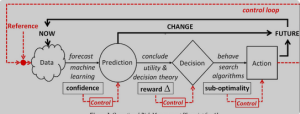Artificial Intelligence (AI) has significantly impacted and transformed various business processes across different industries. The purpose of this study is to delve into intricate relationship between Artificial Intelligence and business processes:

Artificial Intelligence And Business Processes
-
Table of Contents
ToggleAutomation of Repetitive Tasks:
- AI can automate routine and repetitive tasks, allowing employees to focus on more strategic and creative aspects of their work.
- Robotic Process Automation (RPA) is a subset of AI that involves using bots or software robots to automate rule-based tasks.
-
Data Analysis and Decision Making:
- AI technologies, including machine learning, can analyze vast amounts of data quickly and accurately.
- Predictive analytics helps businesses make data-driven decisions by forecasting future trends and outcomes.
-
Customer Service and Engagement:
- AI-powered chatbots and virtual assistants are being used for customer service, providing instant responses to queries and handling routine tasks.
- Natural Language Processing (NLP) enables machines to understand and respond to human language, enhancing communication.
-
Personalization:
- AI algorithms analyze customer behavior and preferences to provide personalized recommendations and experiences.
- E-commerce platforms, streaming services, and social media utilize AI to tailor content to individual users.
-
Supply Chain Optimization:
- AI helps optimize supply chain processes by predicting demand, managing inventory, and improving logistics.
- Predictive analytics can reduce the risk of disruptions and enable more efficient resource allocation.
-
Human Resources and Recruitment:
- AI is used in talent acquisition to screen resumes, conduct initial interviews, and identify suitable candidates.
-
Fraud Detection and Security:
- AI algorithms can analyze patterns and detect anomalies, helping in the early identification of fraudulent activities.
- Security systems use AI for threat detection and response, enhancing cybersecurity measures.
-
Productivity and Collaboration:
- AI tools can streamline collaboration by automating administrative tasks, scheduling, and document management.
- Virtual collaboration platforms leverage AI to improve team communication and efficiency.
-
Healthcare Diagnosis and Treatment:
- AI is used in medical imaging, diagnosis, and treatment planning, improving the accuracy and speed of healthcare processes.
- Predictive analytics helps in identifying potential health issues and designing preventive interventions.
-
Marketing and Advertising:
- AI enhances targeted marketing efforts by analyzing consumer behavior and preferences.
- Programmatic advertising uses AI algorithms to automate the buying of ads and optimize targeting.
While AI offers numerous benefits, organizations must also address ethical considerations, data privacy, and the potential impact on jobs and workforce dynamics as they integrate AI into their business processes.
